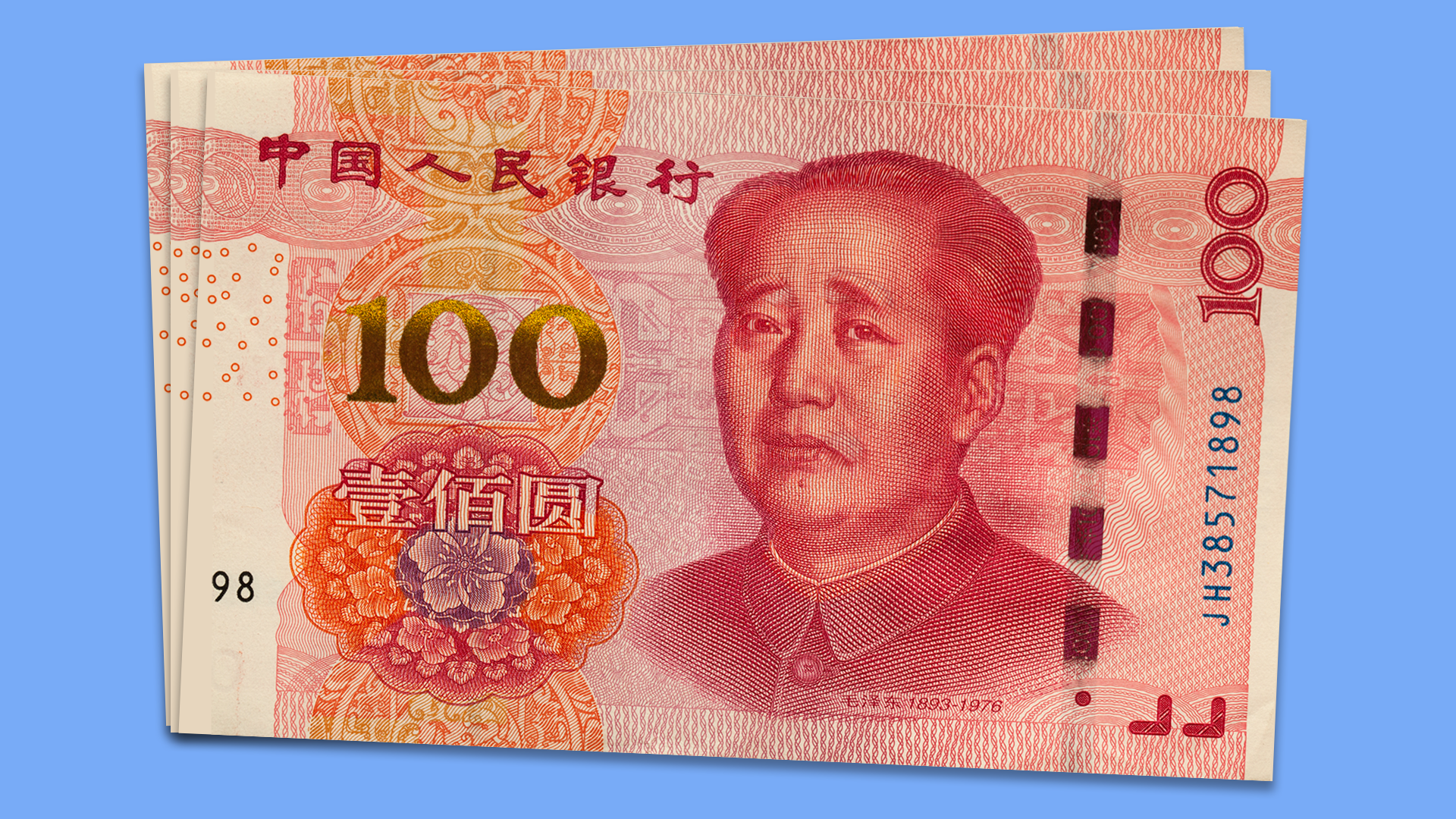| | | | | | | | | | | Axios Markets | | By Matt Phillips and Emily Peck · Sep 09, 2022 | | 💥 Friday. Matt here. We'll spare you the throat-clearing and get right to the newsletter. After all, there's a weekend waiting. Today's newsletter is 1,130 words, 4.5 minutes. | | | | | | 1 big thing: China's unlucky seven |  | | | Illustration: Sarah Grillo/Axios | | | | China's government-influenced currency is tumbling — and it's close to crossing a somewhat sensitive milestone relative to the dollar, Matt writes. Why it matters: The drop in the value of the currency, officially known as the renminbi but often referred to as the yuan or CNY, is symptomatic of the deep problems facing the world's second-largest economy. The big picture: The Chinese policymakers who influence the currency have in the past drawn a line in the sand around the 7-per-dollar level and seemed loathe to let it move beyond that price. - The yuan has weakened by as much as 10% against the dollar over the last six months and on Thursday was hovering around 6.96 per U.S. dollar (though it strengthened a bit Friday to about 6.92).
How it works: Unlike the U.S. dollar, which floats freely in the market without day-to-day interventions from the government, China's exchange rate is determined by a "managed float" system. - Essentially, the government sets an official price each day, and market prices are allowed to fluctuate by 2% above and below the government's number.
- If the government doesn't want the price to cross a certain level, it gradually moves the official price away from that number. The last time the yuan crossed the 7-per-dollar mark was during the height of the trade war in 2019.
- At the time, the move was seen as a signal from Beijing that it would take strong steps to counteract the impact of the Trump administration's tariffs — since a weaker Chinese currency makes China's exports cheaper to American buyers.
What they're saying: Currency analysts at JPMorgan and Bank of America expect the yuan to pass 7-per-dollar soon, and say it's a sign that China's policymakers are growing more worried about the malaise of their economy. State of play: The Chinese Communist Party's state-directed economic system is facing some of the toughest struggles it's ever seen. Between the lines: A weaker currency basically allows China to build on that export strength since the U.S. is its largest export market. - Yes, but: Chinese officials won't want the currency to tumble too quickly, as that could potentially spook investors and prompt efforts to get capital out of the country (something the country's capital controls try to prevent).
What we're watching: How China's leadership discusses the country's economic challenges at its Party Congress next month. |     | | | | | | 2. Catch up quick | | 🧸 White House and Senate Democrats eye child tax credit deal. (Axios) 💄 Citi wins appeal in case of mistaken $500 million payment. (CNBC) 🏚 Mortgage rates are at the highest level since 2008. (AP) |     | | | | | | 3. RIP vaccine mandates |  | | | Illustration: Sarah Grillo/Axios | | | | Some companies are rolling back mandates for employee COVID vaccination — but few are making official public statements about it, Emily writes. Why it matters: These moves signal that we've shifted into a new chapter of the pandemic — and that employers are desperate to get people back to the office. - Employers are trying to reduce any barriers to entry for new hires, says Erin Grau, co-founder of Charter, a media and services company focused on the future of work, hearing from executives who are dropping their mandates.
- The requirements are also expensive and time-consuming for employers — another reason to stop, she adds.
What's happening: "[Companies] decided that the rationale for [mandates] had become weak enough that they don't want to continue," Jeff Levin-Scherz, population health leader at Willis Towers Watson, tells Axios. Companies mostly don't want to talk about this, seeing little upside given the controversial history of mandates. But a few large employers' plans are public: Zoom out: The White House yesterday called on businesses to take certain actions to protect employees and customers from COVID-19 this fall. Mandates weren't on the list. Between the lines: Things have changed a lot since these mandates were first put in place last year — a time when vaccination was seen as very effective against spreading disease. Now with the variants, that's less true, says Leana Wen, a public health professor at George Washington University. - "At this point in the pandemic, the case for vaccine mandates is much weaker than it was in 2021," she adds.
Read the full story. |     | | | | | | A message from Axios | | Win the race for top candidates | | |  | | | | Reach over 1 million smart professionals for remote and local roles by posting your job with Axios. Axios job boards gets your openings in front of qualified candidates to fill your role quickly. Use code FIRST50 for $50 off your posting. | | | | | | 4. A rarity in the bond market |  Data: Bloomberg Global Aggregate Index and Bloomberg U.S. Aggregate Index via FactSet; Chart: Axios Visuals It's not just stocks. A key index tracking global bonds has also reached bear market territory, Axios' Kate Marino writes. Why it matters: Market behavior this year has thrown a wrench in the traditional 60/40 strategy — the idea that if stocks are down, then bond performance will offset the losses, and vice versa. State of play: The benchmark S&P 500 index plunged by as much as 24% this year, and though it's rebounded, many analysts say we're still deep in a bear market. - But for most investors, their bond portfolios won't help them out either. A flagship Bloomberg index of global government and investment grade corporate bonds is now down more than 20% versus its peak in January 2021.
A bear market — or a 20% decline from a recent peak — is rare for these higher-credit quality bonds, since they tend to be much less volatile than the stock market. - The drawdown over the last year and a half is the index's largest fall since its inception in 1990, Bloomberg reports.
What to watch: Whether a similar index of U.S. bonds, which is currently down 12.6% from its peak, heads closer to bear territory as well. |     | | |  | | | | If you like this newsletter, your friends may, too! Refer your friends and get free Axios swag when they sign up. | | | | | | | | 5. America's price panic subsides |  Data: FactSet; Chart: Axios Visuals Inflation expectations have come down sharply, after threatening to get out of control back in March, Matt writes. Why it matters: Runaway inflation expectations are seen as a key ingredient in out-of-control price rises. So, this is one signal that we're not facing a 1970s-style battle with persistent inflation. Driving the news: Market-based inflation expectations known as "breakevens" — extracted by comparing yields on typical Treasury bonds with a kind of inflation-protected Treasury bond — have fallen to their lowest level of the year in recent days. - They're currently around 2.5%, suggesting investors expect inflation to average 2.5% a year, over the next five years.
- Back in March, the measure was 3.6%, well beyond the Fed's comfort zone.
What we're watching for: Any comments from Fed officials suggesting the central bank is feeling less worried about inflation, too. |     | | | | | | A message from Axios | | Win the race for top candidates | | |  | | | | Reach over 1 million smart professionals for remote and local roles by posting your job with Axios. Axios job boards gets your openings in front of qualified candidates to fill your role quickly. Use code FIRST50 for $50 off your posting. | | | | Thanks for reading! If this email was forwarded to you, sign up for Axios Markets here. This newsletter was edited by Kate Marino, and copy edited by Mickey Meece. |  | | Why stop here? Let's go Pro. | | | | | | Axios thanks our partners for supporting our newsletters. If you're interested in advertising, learn more here.
Sponsorship has no influence on editorial content. Axios, 3100 Clarendon Blvd, Arlington VA 22201 | | | You received this email because you signed up for newsletters from Axios.
Change your preferences or unsubscribe here. | | | Was this email forwarded to you?
Sign up now to get Axios in your inbox. | | | | Follow Axios on social media:    | | | | | |











No comments:
Post a Comment